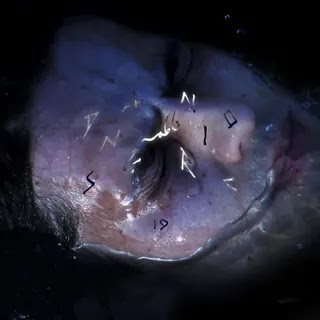A psychogeographic survey of the Himalayan region of Ladakh rendered in ambient drones and harsh noise, Fatima doubles as an uneasy chronicle of capitalist exploitation and generational trauma.
Fear, anger, and alienation have long been the dominant emotions in Ruhail Qaisar’s music. His early solo releases and live sets—under the now defunct moniker SISTER—married the blackened death metal of his short-lived band Vajravarah with power electronics, no wave, and post-industrial noise. A guitar-and-laptop-toting techno shaman harnessing the forces of cosmic chaos for a shock-and-awe assault on the sensibilities of Mumbai and Delhi hipster elites, Qaisar crafted music so brain-pulverizingly visceral that it drowned out all thought. A friend once called it a palate cleanser for the soul.
Qaisar, however, had higher ambitions than crafting sonic mind-wipes, and sometime in 2016 he shifted gears. On that year’s Ltalam EP, he pared back the redlining noise in favor of tense, eldritch atmospheres and mutated found sounds—spectral transmissions from a pre-modern Ladakh, the geographically isolated and geopolitically contested Himalayan region that is Qaisar’s home. He also started experimenting with analog photography and film, drawing these disparate endeavors into an overarching project of hauntological excavation meant to tease the phantoms of Ladakh’s past out from their hiding places in its late-capitalist, tourist-economy present. He carries that work forward on his debut album, Fatima, an uneasy chronicle of personal and generational trauma, and a psychogeographic survey of his homeland’s windswept granite peaks and shrubland valleys.
The Ladakh that Qaisar mourns on Fatima isn’t the mystical and isolated “last Shangri-La” of European imagination, nor is it the tokenized Himalayan fantasy of contemporary Indian tourists. Instead it is the hybrid culture of a polity set on the crossroads of the Silk Route, a land where Indian and Tibetan Buddhism, Islam, Hinduism, and remnants of pre-Buddhist religion rubbed shoulders with each other—a society whose inhabitants, according to anthropologist Martin A. Mills, once saw themselves as part of a complex cosmology of spirits, protectors and itinerant demons. It’s a world of chthonic rituals, exorcisms, and possessions, of regular communion with the supernatural.
It’s also a Ladakh that is rapidly disappearing—its borders redrawn by 20th-century nationalism, the phasphun system of inter-religious harmony shredded by politics of communalism, its few remaining totems crumbling under the pressures of rapid technological change and what Qaisar calls the “soft-power subjugation of the tourism industry.”
Fatima is an elegy for this Ladakh, and for the futures it could not realize. The album’s discordant drones and atonal shrieks are inscribed with the trauma of recent history—both the external violence of colonialism and militarization and the psychic violence of industrialization and late capitalism. As we traverse this ruined, decaying landscape, we stumble upon echoes of the past—bucolic vistas of serene beauty, revenants of cosmological horror—that Qaisar has painstakingly resurrected through field recordings and experimental transmutations of traditional Ladakhi music and lore.
Ponderous bass pulses in the background of “Fatima’s Poplar” as an alien skittering noise dominates the foreground while a voice reads an excerpt from English philosopher Nick Land’s Circuitries with theatrical flourish. Halfway in, gothic performance gives way to a slab of distorted noise, its edges keening like a chainsaw cutting through rusty metal. But while Land and his accelerationist contemporaries embraced capitalism’s creative destruction with revolutionary ecstasy, Qaisar’s invocation is more ambivalent, suffused with dread of the promised singularity.
On “Sachu Melung,” a high-pitched synth whistles in and out, like the wind through Ladakh’s craggy valleys. Disembodied voices trill and murmur in pre-lingual syllables on anti-tourism meditation “Abandoned Hotels of Zangsti” and post-rockish “Seventh Dream (Ramazan’s Wedding),” suggesting the ghostly whisperings of insurgent spirits hiding out in the vast Ladakhi dominion of rock and scrubland. That sense of menace crystallizes into primordial horror on the brooding, atmospheric “Painter Man,” its throbbing basslines and Dis Fig’s spectral whisper eventually giving way to a Lynchian cacophony of horns and gongs.
Elsewhere, Qaisar grapples more directly with recent history. “Partition (From Astore to Leh)” explores the psychological scars of Britain’s hasty exit from the subcontinent through the lens of Ladakhi experience. The historiography of Partition is dominated by the paroxysms of communal violence and mass displacement that engulfed Punjab and Bengal, and the decades-long conflict that is still simmering in Kashmir. Ladakh’s wounds were less visible but no less profound. Qaisar’s invocation of Astore and Leh—two cities with a long shared history—is a nod to that geopolitically enforced separation, a split evoked in the mournful interplay between two achingly serene chords. In the distance, you can hear rumbling thunder: the war drums of nationalism and modernity.
Fatima reaches its sepulchral apotheosis on closer “The Fanged Poet.” Qaisar’s distortion-drenched guitar unfurls with stoner-doom gravitas over a ritualistic drum beat, while Rohit Gupta’s trumpet squalls in increasingly tortured agony. Delay-soaked field recordings lurk beneath the sludge, occasionally surfacing as half-formed snatches of barely heard conversation, lending a further sense of surreality. The guitar and drums build to a slow-burn crescendo before fading away, leaving only the death throes of Gupta’s trumpet before it, too, retreats into silence. It’s a hypnotic eulogy for a world that has passed, leaving behind only its ghosts and its scars.



0 comments:
Post a Comment